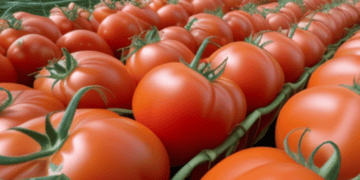In the north Indian state of Haryana, farmer Ramesh Pangal, known as the “Tomato King,” faced significant financial challenges due to fluctuating tomato prices. Despite a good harvest on his 21-hectare farm, the low wholesale price of tomatoes led to substantial losses, failing to cover production costs. In May, the price Pangal received was merely 1.24 rupees (1 cent) per kilogram, prompting him and other farmers to destroy part of their crops in protest.
Similar situations occurred across India, where farmers either abandoned or destroyed their tomato crops due to unprofitable prices. However, by July, heavy rains damaged the remaining crops, causing a shortage and a sharp rise in tomato prices. In some cities, prices soared to 200-250 rupees ($2.43-$3.04) per kilogram, a nearly 1,500 percent increase, affecting household budgets and restaurant menus.
This price surge benefited some farmers, like Eshwar Gayakar in Maharashtra, who sold his tomato crop for a substantial profit. However, the fluctuating prices led to concerns from the Reserve Bank of India about the potential impact on inflation, as food has a significant weight in India’s Consumer Price Index.
The federal government intervened by buying tomatoes at higher prices and selling them at subsidized rates in some cities. However, critics argue that the government’s selective interference only in times of high prices is problematic and call for consistent policies.
The high cost of production and transportation, along with unpredictable weather, has exacerbated the challenges for tomato farmers. For instance, Pangal noted a three-fold increase in labor costs and a significant rise in the price of manure since 2007, yet the wholesale price of tomatoes remained low in May.
Experts argue that the government should invest in processing units and affordable cold storage facilities to address the recurring problem of tomato shortages and price fluctuations. They suggest that creating a regulatory body for the agriculture produce market, similar to other sectors, could help balance the interests of all stakeholders.
Forming cooperatives and investing in cold storage chains with government support, as done in the dairy industry, is proposed as a long-term solution to ensure fair prices for farmers while protecting consumers from sudden price shocks. The Indian government has initiated steps in this direction, but these measures are yet to address the immediate challenges faced by farmers and consumers.
Stay informed on supply chain news at The Supply Chain Report. Free international trade tools are at ADAMftd.com.
#TomatoCrisisIndia #HaryanaFarmers #FluctuatingTomatoPrices #TomatoKing #IndianFarmersStruggle #FoodInflationIndia #GovernmentIntervention #FarmersProtest #MaharashtraFarmers #TomatoPriceSurge #AgricultureChallenges #ColdStorageSolution #IndianAgriculturePolicy #FarmerSupport #TomatoShortage #FoodSecurity #AgricultureRegulation #CooperativeFarming #SustainableFarming #FoodProcessingUnits #SupplyChainChallenges #FarmersVoices #PriceVolatilityIndia #RuralEconomy #SubsidizedRatesIndia















